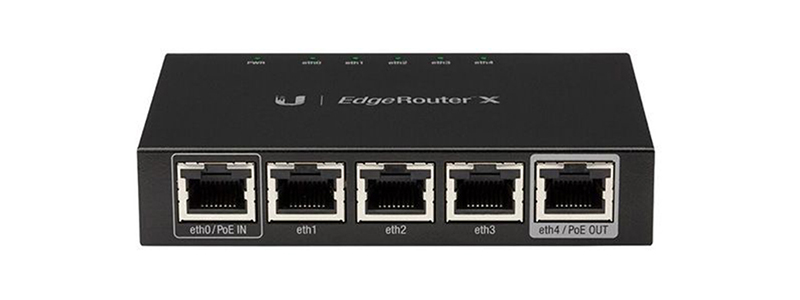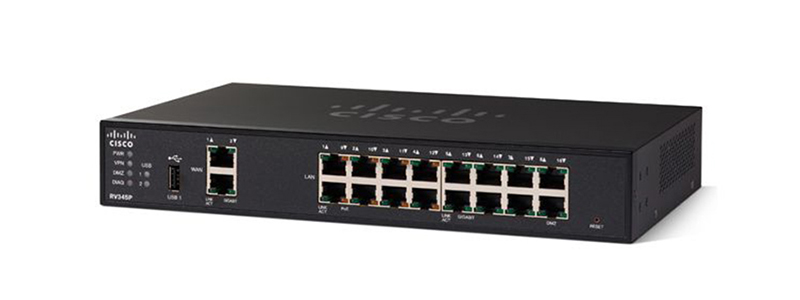If you use routers for a long time, you must have noticed that some routers do not have USB ports. Well, this feature is particularly important because it allows users to share USB printers or external drives with the network.
There is also a guest Wi-Fi option, which is a very convenient feature for routers used in homes and business environments because it allows users to broadcast separate wireless networks. Therefore, you can invite visitors to join your network without compromising the security of the private network. Next, we will compare Ubiquiti and Cisco routers, and you will know which one is more suitable for you.

Ubiquiti vs Cisco- how do they compare?
Ubiquiti
Ubiquiti does have several effective routers under its brand, with powerful functions and software. Therefore, for users who want to access the performance updates of their devices, Ubiquiti provides them with an intuitive user interface in its edge routers. In addition to managing routers through mobile phones, users can also customize some router settings to meet their needs.
For example, they will be able to configure the routing security and management functions required for the efficient operation of the network. Other important features include the VLAN interface, which does have some major advantages, such as restricting broadcast domains, reducing broadcast traffic, and ease of management. Therefore, VLAN helps improve network performance by dividing large broadcast domains into smaller broadcast domains.
Regarding the management of Ubiquiti edge routers, users have two choices, namely, centralized control through Ubiquiti’s network management system (UNMS). The above provides complete management control and a graphical user interface. Another option is the mobile app, available on Google Play or the app store.
Therefore, UNMS allows users to use their device (tablet or mobile phone) to manage the router, where they can display or configure various settings, such as the throughput of each port system, system settings and interface information.
Cisco
The configuration of each Ubiquiti router is different, including the number of ports and the number of packets transmitted per second. On the other hand, Cisco provides a comprehensive solution for its routers, the Internet Operating System (IOS). The latter technology was later integrated into most of Cisco’s network equipment, such as Cisco Catalyst switches.
Therefore, IOS performs most of the functions on routers, some of which are to ensure high-speed traffic connections between network devices. The application also controls and prevents unauthorized network access, prevents all forms of threats to your data, and most importantly, it provides scalability.
The above content allows companies to easily expand their networks without investing in other independent equipment. Nevertheless, in terms of scalability, Cisco routers have two designs, one is a fixed chassis and the other is a modular chassis. These two options are designed to serve two types of users, so if you don’t have any plans to expand your network, then a fixed chassis will be perfect for you.
However, if you plan to expand your network, then the modular chassis is your router, where you can add ports and interfaces at will, but remember that you cannot get rid of existing ports or interfaces. As we mentioned before, Cisco routers are designed to provide solutions to your network problems.
To this end, IOS has been configured to connect two different types of networks that use different media types. Remember that each media type uses a different format to transmit data, so IOS can understand the formats of all modern media types and can even hide them.
For example, it can realize the connection of wireless network and wired network, or the connection of LAN network and WAN network. The security features of Cisco routers are also under IOS, but users can freely control the security features to suit their strategies. For example, they can configure IOS to allow or deny access to specific applications.
Therefore, the IOS operating system is comprehensive, so it is reliable in the operation of your router, and given the stability provided by IOS, enterprise networks, including ISPs, utilize Cisco products in a variety of ways.
Ubiquiti vs Cisco routers
Ubiquiti
What we like
- Setting up the router is easy
- The units offer high speeds and are powerful
- The routers are reliable
- Features advanced security features
What we don’t like
- Has limited hardware options
- Use and management involves a steep learning curve
Cisco
What we like
- Are scalable thus enable the growth of a network
- Uses the IOS application to prevent and control unauthorized access
- Set up and installation is pretty easy
- Routes traffic between the subnets
What we don’t like
- Might need an IT expert to achieve the perfect installation
- Initial installation cost is pretty high
Conclusion
Both Ubiquiti and Cisco routers are great choices for networking, but you must match your needs with the type of router you want to use. However, because they all have unique meanings, if you want to use the above-mentioned routers for commercial purposes, then it is best to choose Cisco because of its scalability.
More information please click here:Routers, Huawei Routers, Juniper Routers, D-Link Routers
Learn more:
Layer 3 Switch vs. Router: Can Layer 3 Switch Replace Router?
Can I Use Gigabit Routers to Speed Up My Network, Under the 100M Fiber broadband?
OPPO 5G CPE T1a WiFi Router: 5G Is Enough For The Whole-Home
HUAWEI Router H6: Equipped With HarmonyOS Pave The Way For The Whole-Home Smart
Xiaomi Router AX9000: Feel The Power Of Wi-Fi 6 Enhanced Edition




